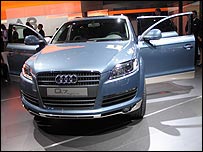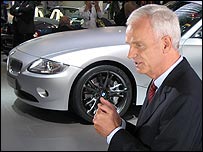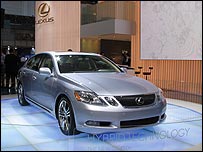By Jorn Madslien
BBC News business reporter at the Frankfurt motor show
The green car revolution is well under way, with most car makers proudly showing off hybrid cars that combine traditional petrol engines with electric motors at this year's motor show in Frankfurt.
showing off hybrid cars that combine traditional petrol engines with electric motors at this year's motor show in Frankfurt.
 showing off hybrid cars that combine traditional petrol engines with electric motors at this year's motor show in Frankfurt.
showing off hybrid cars that combine traditional petrol engines with electric motors at this year's motor show in Frankfurt.(Right picture: Audi's Q7 hybrid gets ready to take on Lexus)
Audi's Q7 and BMW's X3 hybrid concepts were among the newcomers; both luxurious sports utility vehicles (SUVs) that will compete head-on with the Lexus RX400h hybrid that was launched more than a year ago by Toyota's luxury subsidiary.
Elsewhere, the new luxurious S-class is used to show off a Mercedes hybrid concept, Honda's popular Civic is also in on the game with a hybrid set to hit the road after Christmas, and Lexus is showing off its GS450h luxury saloon that will go on sale next spring.
Playing catch-up
It is a radical change from the past, when most car makers were dismissive of the whole idea behind hybrid technology.
They have since seen the sales of the pioneers in the market, Honda and Toyota, rocket along with soaring oil prices, and this has forced them to respond quickly.
Ford has already bought technology from Toyota for its Explorer SUV hybrid.
The South Korean car makers Hyundai and Kia have advanced plans to introduce hybrid cars next year.
On Tuesday, Shanghai Automotive said it was working with both Volkswagen and Genera l Motors to produce hybrid cars in time for the Olympic Games in Beijing in 2008. Porsche and Volkswagen are also gearing up for a hybrid partnership.
l Motors to produce hybrid cars in time for the Olympic Games in Beijing in 2008. Porsche and Volkswagen are also gearing up for a hybrid partnership.
 l Motors to produce hybrid cars in time for the Olympic Games in Beijing in 2008. Porsche and Volkswagen are also gearing up for a hybrid partnership.
l Motors to produce hybrid cars in time for the Olympic Games in Beijing in 2008. Porsche and Volkswagen are also gearing up for a hybrid partnership.(Right picture: Tie-ups to develop the technology are vital, says BMW's Helmut Panke)
And late last week, it was revealed that BMW is to join General Motors and DaimlerChrysler's hybrid alliance to jointly develop the technology.
"If each of us would have done it on our own we would never have reached the volume needed to make it economical," observes Helmut Panke, chief executive of BMW.
Niche market
But despite the loud and confusing displays of hybrid concepts at the Frankfurt motor show, the efforts by the big car groups seem less than ambitious.
BMW's concept, for example, adds a spurt of electric power that adds torque, which does indeed improve efficiency, but it is not a full-blown hybrid engine designed to power the car with stored-up electrics.
Moreover, the commitment of the major companies' executives to hybrid technology appears weak.
Mercedes boss Dieter Zetsche highlighted how its diesel-powered M-class had delivered better fuel efficiency than the Lexus RX400h hybrid in a recent test by a German car magazine.
BMW's Mr Panke is even more blunt. He predicts that hybrid car sales will never rise above more than 1%-2% of the total market, and PSA Peugeot Citroen's chief executive Jean-Martin Folz agrees.
more than 1%-2% of the total market, and PSA Peugeot Citroen's chief executive Jean-Martin Folz agrees.
 more than 1%-2% of the total market, and PSA Peugeot Citroen's chief executive Jean-Martin Folz agrees.
more than 1%-2% of the total market, and PSA Peugeot Citroen's chief executive Jean-Martin Folz agrees.(Right picture: Lexus hopes 25% of its sales in Europe next year will be hybrids)
"If you look at the gain in consumption and hold that against the cost of the engine then I do not see a viable market," he says.
"A hybrid engine is structurally more expensive than a diesel engine."
Most car makers accept that hybrids do improve the air in urban environments, but insist that a loftier target is the overall reduction of emissions.
"The hybrid can dislocate the exhaust, but this is not the main target in Europe," says BMW's sales and marketing director, Michael Ganal.
In Europe , CO2 emission levels have fallen 11% in the last decade and manufacturers have agreed to voluntarily reduce emission levels to less than 140 grams per kilometre by 2009 at the latest, but it is an open secret that few expect the goal to be reached.
Beneficial competition
Companies that are selling hybrid cars today, rather than some time in the future, are much more optimistic about future demand.
Lexus expects its hybrids to make up for a quarter of its total sales in Europe next year, and as more models are added this proportion should continue to increase.
Its parent company Toyota believes customer interest can only grow as ever more car makers join the game, and such demand could firm up manufacturers' commitment to develop the technology.
"The element of competition was introduced in hybrids and that I believe will lead to the widespread use of hybrids," says Toyota President Katsuaki Watanabe.
{ 0 komentar... read them below or add one }
Posting Komentar